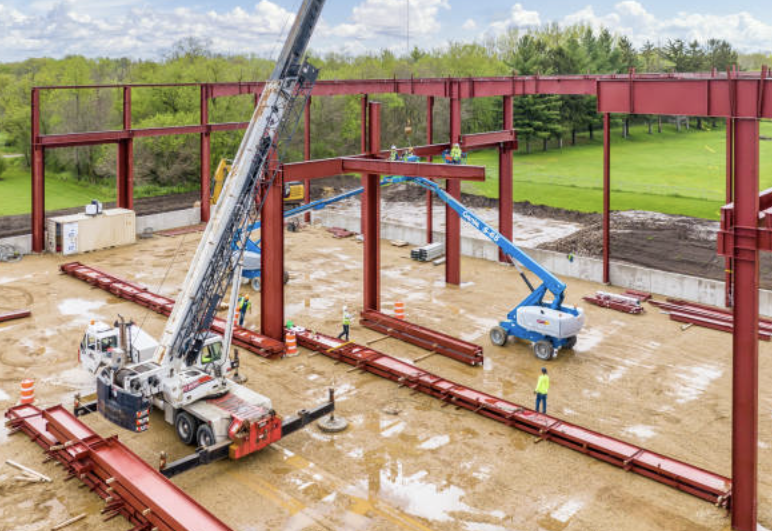The U.S. metal fabrication and steel erection industries are cornerstones of infrastructure, manufacturing, and construction. These industries require highly skilled professionals to produce quality metal products, erect structures safely, and meet the growing demand for innovative solutions. Below, we explore the most in-demand skills, key roles, and why these capabilities are essential to the industry's success.
What is Metal Fabrication?
Metal fabrication is the process of creating structures, components, or parts by cutting, bending, and assembling raw metal materials. This field plays a crucial role in manufacturing, construction, and infrastructure development.
What Are Steel Erection Industries?
Steel erection refers to the assembly of steel components to create frameworks for buildings, bridges, and other large structures. Professionals in this sector ensure that steel frameworks are installed accurately, safely, and efficiently.
Skills in High Demand
1. Welding Expertise
- Why it’s in demand: Welding is a fundamental process in both metal fabrication and steel erection. Skilled welders ensure the strength and integrity of metal joints, which are critical to the safety and durability of projects.
- Specific techniques: MIG, TIG, and stick welding are the most sought-after welding skills.
2. Blueprint Reading and Technical Drawing
- Why it’s in demand: Interpreting blueprints and technical drawings ensures projects are built to specifications. Precision is key in industries that demand high accuracy.
- Associated tools: CAD (Computer-Aided Design) software proficiency is a valuable asset.
3. CNC Machine Operation
- Why it’s in demand: CNC (Computer Numerical Control) machines are pivotal in modern fabrication. Operators with programming and troubleshooting skills are essential for efficient, error-free production.
- Key machines: CNC mills, lathes, and plasma cutters.
4. Structural Steel Knowledge
- Why it’s in demand: Understanding the properties of structural steel, including load capacity and welding suitability, is vital for safe and effective construction projects.
- Related certifications: AISC Steel Construction certification is a plus.
5. Safety and Compliance Knowledge
- Why it’s in demand: Safety is paramount in both industries. Workers must adhere to OSHA regulations and industry best practices to prevent accidents.
- Key skills: Hazard identification, PPE (Personal Protective Equipment) usage, and emergency response.
6. Robotic System Expertise
- Why it’s in demand: Automation is increasingly prevalent in metal fabrication. Technicians skilled in programming and maintaining robotic systems are in high demand.
- Key applications: Robotic welding, assembly, and material handling.
7. Sheet Metal Fabrication Skills
- Why it’s in demand: Sheet metal work involves creating parts for HVAC systems, automotive components, and architectural projects.
- Core tasks: Cutting, bending, and fastening sheet metal with precision.
Top Roles in Demand
- Fabricators: Specialists in creating custom metal parts and components.
- Welders and Weld Inspectors: Professionals who perform and verify the quality of welds.
- CNC Programmers: Experts in coding CNC machines for efficient production.
- Structural Ironworkers: Skilled in erecting steel frameworks for large structures.
- Safety Inspectors: Individuals responsible for maintaining compliance and ensuring worker safety.
Market Trends Driving Demand
- Infrastructure Investment: The U.S. is focusing on rebuilding infrastructure, leading to increased demand for skilled steel and fabrication professionals.
- Automation and Robotics: The adoption of advanced technologies has created new opportunities for workers with robotics and automation expertise.
- Green Building Initiatives: Sustainable construction practices require new fabrication techniques and materials knowledge.
FAQs
1. What qualifications are required to work in metal fabrication?
- Basic qualifications include high school education, but trade certifications, apprenticeships, and vocational training are highly recommended. Proficiency in welding, CNC programming, or blueprint reading can be an advantage.
2. What certifications are valued in the steel erection industry?
- OSHA safety certification, AISC Steel Construction certification, and NCCER credentials are highly valued.
3. Are there opportunities for automation specialists in these industries?
- Yes, automation is a growing field. Roles involving robotic systems, CAD/CAM software, and CNC operations are in high demand.
4. How can I improve my skills for this industry?
- Enroll in vocational training, earn certifications in welding or CNC programming, and seek internships or apprenticeships for hands-on experience.
5. What industries hire metal fabrication and steel erection professionals?
- Construction, automotive, aerospace, manufacturing, and renewable energy sectors all hire extensively.
Question and Answer Section
Q: How does welding impact structural integrity in steel erection?
A: Welding is critical to creating strong, durable connections between steel components. Poor welding can lead to structural failures, making skilled welders indispensable.
Q: What are the top machines used in metal fabrication?
A: Common machines include CNC mills, plasma cutters, robotic welders, press brakes, and laser cutting machines.
Conclusion
The U.S. metal fabrication and steel erection industries offer immense opportunities for skilled professionals. Whether you specialize in welding, CNC operation, or structural steel assembly, the demand for expertise is growing alongside advancements in technology and infrastructure investment. Acquiring the right skills and certifications ensures a successful career in these dynamic fields.




